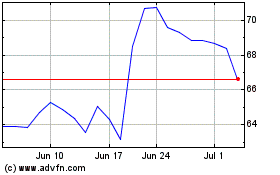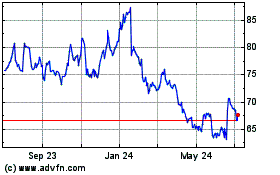Gilead Sciences, Inc. (Nasdaq: GILD) and the Cardiovascular
Research Foundation (CRF) today announced the initiation of
RIVER-PCI (Ranolazine for Incomplete VEssel
Revascularization post-PCI), a Phase 3 clinical trial
evaluating the utility of ranolazine to prevent major adverse
cardiovascular events (MACE) in patients with a history of chronic
angina who have incomplete revascularization following percutaneous
coronary intervention (PCI). RIVER-PCI will enroll 2,600 patients
at approximately 200 investigative centers in the United States,
Canada, Europe and Israel.
PCI is a common procedure used to revascularize (unblock)
narrowed coronary arteries and improve blood flow to the heart.
Incomplete revascularization is defined as having residual disease
(50 percent or greater stenosis or narrowing) following the PCI in
one or more coronary arteries.
“Despite the widespread use of revascularization technologies
and optimal medical therapy for coronary artery disease, the
incidence of angina after PCI remains high, contributing to repeat
procedures and hospitalizations, as well as increased outpatient
testing and resource utilization,” said Gregg W. Stone, MD,
Professor of Medicine and Director of Cardiovascular Research and
Education at Columbia University Medical Center (CUMC) and
Co-Director of the Medical Research and Education Division at CRF.
“In analyses of registries and clinical trial data, recurrent
anginal or ischemic symptoms after PCI have been found to be more
common in patients with incomplete revascularization, suggesting
that new therapeutic strategies are needed.”
“Ranolazine has established safety and efficacy as treatment for
chronic stable angina, but this is the first time the therapy is
being studied specifically in a post-PCI setting as part of a
randomized clinical trial,” said Norbert W. Bischofberger, PhD,
Gilead’s Executive Vice President, Research and Development and
Chief Scientific Officer. “We are pleased to partner with CRF on
this study, which will determine if the addition of ranolazine to
standard therapy is effective in reducing post-PCI ischemic events,
including reductions in post-PCI hospitalization, repeat PCI and
the incidence of myocardial infarction and death.”
RIVER-PCI will be led by principal study investigator Giora
Weisz, MD, Director of Cardiovascular Research at CUMC and chaired
by Dr. Stone.
Ranolazine is indicated for the treatment of chronic angina.
Ranolazine has not been determined to be safe or efficacious as a
treatment to reduce major adverse cardiovascular events in patients
who have undergone PCI.
Study Design
RIVER-PCI is a randomized, double-blind, placebo-controlled
study designed to evaluate the effects of ranolazine on major
adverse cardiovascular events (MACE) in patients with a history of
chronic angina who undergo PCI with incomplete revascularization.
The study will enroll 2,600 patients with a history of chronic
angina who undergo coronary angiography and PCI either for an acute
coronary syndrome (ACS) or for an elective (non-ACS) indication and
who have angiographic evidence of incomplete revascularization
following the procedure. Eligible post-PCI patients will be
randomized in a 1:1 ratio to receive twice-daily ranolazine or
matching placebo in addition to their standard medical therapy and
followed for at least one year post randomization. The study will
continue until at least 721 post-randomization major adverse
cardiovascular events have been observed.
The primary efficacy endpoint is the incidence of MACE, as
defined by the composite of cardiovascular death, myocardial
infarction (MI) or hospitalization for ischemia or angina.
Secondary endpoints include the incidence of the individual
components of the primary endpoint, sudden cardiac death and
evaluation of quality of life and health-related costs.
About Ranolazine
Ranolazine is an extended-release tablet approved under the
tradename Ranexa® as a treatment for chronic angina. Ranexa may be
used in combination with beta blockers, nitrates, calcium channel
blockers, anti-platelet therapy, lipid-lowering therapy, ACE
inhibitors and angiotensin receptor blockers. Ranexa was approved
in the United States in January 2006. In 2008, the U.S. Ranexa
indication was updated to include first-line treatment for chronic
angina.
Ranexa at therapeutic levels can inhibit the cardiac late sodium
current. However, the mechanism of Ranexa’s antianginal effects has
not been established. The relationship between the inhibition of
the late sodium current and angina symptoms is uncertain.
A large placebo-controlled trial of Ranexa in patients with
acute coronary syndrome did not achieve the primary efficacy
endpoint for Ranexa of a reduction in the composite of
cardiovascular death, myocardial infarction or recurrent ischemia.
Ranexa is not approved for the treatment of acute coronary
syndrome.
Important Safety
Information
Ranexa is contraindicated in patients taking strong inhibitors
of CYP3A (e.g., ketoconazole itraconazole, clarithromycin,
nefazodone, nelfinavir, ritonavir, indinavir and saquinavir), in
patients taking inducers of CYP3A (e.g., rifampin, rifabutin,
rifapentin, phenobarbital, phenytoin, carbamazepine and St. John’s
wort) and in patients with liver cirrhosis.
Ranexa blocks IKr and prolongs the QTc interval in a
dose-related manner.
Clinical experience in an acute coronary syndrome population did
not show an increased risk of proarrhythmia or sudden death.
However, there is little experience with high doses (> 1000 mg
twice daily) or exposure, other QT-prolonging drugs, potassium
channel variants resulting in a long QT interval, in patients with
a family history of (or congenital) long QT syndrome, or in
patients with known acquired QT interval prolongation.
The most common adverse reactions (greater than 4 percent and
more common than placebo) during treatment with Ranexa were
dizziness, headache, constipation and nausea.
It is recommended to initiate Ranexa treatment with 500 mg twice
daily and increase to the maximum recommended dose of 1000 mg twice
daily, based on clinical symptoms. Ranexa tablets should be
swallowed whole; do not crush, break or chew.
The maximum dose of Ranexa should be limited to 500 mg twice
daily in patients on moderate CYP3A inhibitors (e.g., diltiazem,
verapamil, erythromycin, fluconazole and grapefruit juice or
grapefruit-containing products).
Ranexa should not be used with CYP3A inducers or strong CYP3A
inhibitors. The dose of Ranexa should be modified with moderate
CYP3A inhibitors.
Ranexa exposure is increased with P-gp inhibitors (e.g.,
cyclosporine); titrate Ranexa based on clinical response.
Limit simvastatin to 20 mg when used with Ranexa. Doses of other
sensitive CYP3A substrates (e.g., lovastatin) and CYP3A substrates
with narrow therapeutic range (e.g., cyclosporine, tacrolimus,
sirolimus) may need to be reduced with Ranexa.
Doses of drugs transported by P-gp (e.g., digoxin) or
metabolized by CYP2D6 (e.g., tricyclic antidepressants and
antipsychotics) may need to be reduced.
Full prescribing information for Ranexa is available at
www.gilead.com and at www.ranexa.com.
About Cardiovascular Research
Foundation
The Cardiovascular Research Foundation (CRF) is an independent,
academically focused nonprofit organization dedicated to improving
the survival and quality of life for people with cardiovascular
disease through research and education. Since its inception in
1991, CRF has played a major role in realizing dramatic
improvements in the lives of countless numbers of patients by
establishing the safe use of new technologies, drugs and therapies
in the subspecialty of interventional cardiology and endovascular
medicine. For more information, please visit www.crf.org.
About Gilead Sciences
Gilead Sciences is a biopharmaceutical company that discovers,
develops and commercializes innovative therapeutics in areas of
unmet medical need. The company's mission is to advance the care of
patients suffering from life-threatening diseases worldwide.
Headquartered in Foster City, California, Gilead has operations in
North America, Europe and Asia Pacific. For more information on
Gilead, please visit www.gilead.com.
Gilead Forward-Looking
Statement
This press release includes forward-looking statements, within
the meaning of the Private Securities Litigation Reform Act of
1995, that are subject to risks, uncertainties and other factors,
including the risks related to Gilead’s ability to enroll patients
in the Phase 3 clinical trial as planned, the possibility of
unfavorable results of the clinical trial, the need to modify or
delay our clinical trial or to perform additional trials and the
risk of failing to obtain approvals from regulatory authorities. As
a result, use of ranolazine to reduce major adverse cardiovascular
events in post-PCI patients with a history of prior chronic angina
may never be successfully commercialized. Further, Gilead may make
a strategic decision to discontinue development of ranolazine in
post-PCI patients with a history of prior chronic angina if, for
example, Gilead believes commercialization will be difficult
relative to other opportunities in its pipeline. These risks,
uncertainties and other factors could cause actual results to
differ materially from those referred to in the forward-looking
statements. The reader is cautioned not to rely on these
forward-looking statements. These and other risks are described in
detail in Gilead's Quarterly Report on Form 10-Q for the quarter
ended June 30, 2011, as filed with the U.S. Securities and Exchange
Commission. All forward-looking statements are based on information
currently available to Gilead, and Gilead assumes no obligation to
update any such forward-looking statements.
Ranexa is a registered trademark of Gilead
Sciences, Inc.
Gilead Sciences (NASDAQ:GILD)
Historical Stock Chart
From May 2024 to Jun 2024

Gilead Sciences (NASDAQ:GILD)
Historical Stock Chart
From Jun 2023 to Jun 2024
